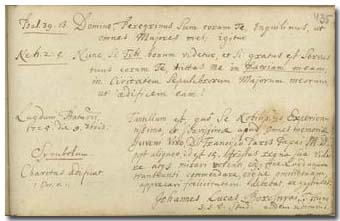
Psal. 39:13. Domine, peregrinus sum coram Te,
Inquilinus, ut omnes majores mei; * igitur
Neh. 2:5. Nunc, Si Tibi bonum videtur, et si gratus
est Servus tuus coram Te, mittas me in Patriam
meam, in Civitatem sepulchrorum majorum
meorum, ut aedificem eam! *
Tantillum est, quô se Nobilissimo, Experientissimo, et suavissimae
apud omnes memoriae Juveni Viro, D. Francisco Pariz Papai M. D.
post aliquot, id est 15. Aristas regna sua videre atque mirari
volenti, eôque fine Lugdunum transeunti commendare, eique
omnigenam apprecari faelicitatem debebat, ac gestiebat.
Johannes Lucas Borosnyai T[ranssylvanus] Hung[arus]

Lugduni Batavor[um] 1725 die 9 7bris
Symbolum Charitas aedificat. 1Cor. 8. 1.
|
* Ps 39:13: Vulgate: “Domine, advena
sum apud te et peregrinus sicut omnes patres mei”. * Neh 2:5: Vulgate: “si videtur regi
bonum et si placet servus tuus ante faciem tuam ut mittas me
in Iudaeam ad civitatem sepulchri patris mei et aedificabo
eam”. – Those two words (“you” instead of “regi”, and
“unto my fatherland” instead of “in Iudaeam”) with which the
quotation was actualized, are underlined in the manuscript.
|
|
|
Ps 39:13: Lord, I am a stranger with thee, and
a sojourner, as all my fathers were. * therefore
Neh 2:5: if it please you, and if thy servant have
found favour in thy sight, that thou wouldest send
me unto my fatherland, unto the city of my
fathers' sepulchres, that I may build it *
With this trifle I want to recommend myself into the memory of the
very noble and experienced young Ferenc Pápai Páriz, dear to
everybody, who after some – namely 15 – collections of ears now
finally wishes to see and contemplate his fatherland, and on his
way home halts in Leiden; and to wish him all the best
János Borosnyai Lukács,
Transylvanian Hungarian
student of theology, who is going to set out
to the same country
In Leiden, on September 9, 1725.
Motto: Charity aedifieth. 1Cor
8:1.
|
p.
435. Leiden, September 9, 1725
Borosnyai, Lukács János
(1694-1760), Transylvanian Reformed
bishop
János
Borosnyai Lukács was born in the summer of 1694 in Feldoboly (Háromszék county, today Dobolii de Sus), the son of the villein Lukács
János. From 1707 he learned in the school of Nagyborosnyó (Boroşneu Mare),
and from 1711 in Nagyenyed (Aiud). In 1716 he became the tutor of
István, son of Count Miklós Bethlen. In 1719 he was a teacher in
the College of Nagyenyed, and in 1720 rector of school in Vízakna
(Ocna Sibiului). From 1721 he studied in Frankfurt an der Oder,
and between 1722 and 1726 in Leiden. After returning home, he
became court pastor of Countess Kemény in Marosvécs (Brîncoveneşti).
In 1727 he was chaplain, then pastor in Nagyenyed, in 1735 a
teacher in Székelyudvarhely (Odorheiu Secuiesc). In the Synod of
Nagyenyed of 1748 he was elected notary general of the diocese,
and in 1749 Bishop of Transylvania. From 1751 he was also a pastor
in Marosvásárhely (Târgu Mureş) where he died in February 9, 1760.
During the years of his office the use of organs began to spread
in Reformed churches. His memoirs have been preserved in
manuscript. His work, apart from his funeral sermons: Catechismusi házikints, avagy a
keresztyéni hit fő ágazatinak kérdések és feleletek által való
magyarázattya … Stehelin Kristóf után. Kolozsváratt, 1752.
(Staehelin, Christoph: Catechetischer Hauß-Schatz, oder
Erklärung des Heidelbergischen Catechismi durch Frag und Antwort.
Basel, 1728. 2 Bde. Neue Auflage, 1752.)
Borosnyai wrote in the album in 1725, in the last
year of his studies in Leiden, indicating that he is also going to
return home soon (eodem
rediturus).
•
Graaf • MÉL • MNL • Peregrinus • Szinnyei • ÚMÉL • ÚMIL •
Zoványi-Ladányi |